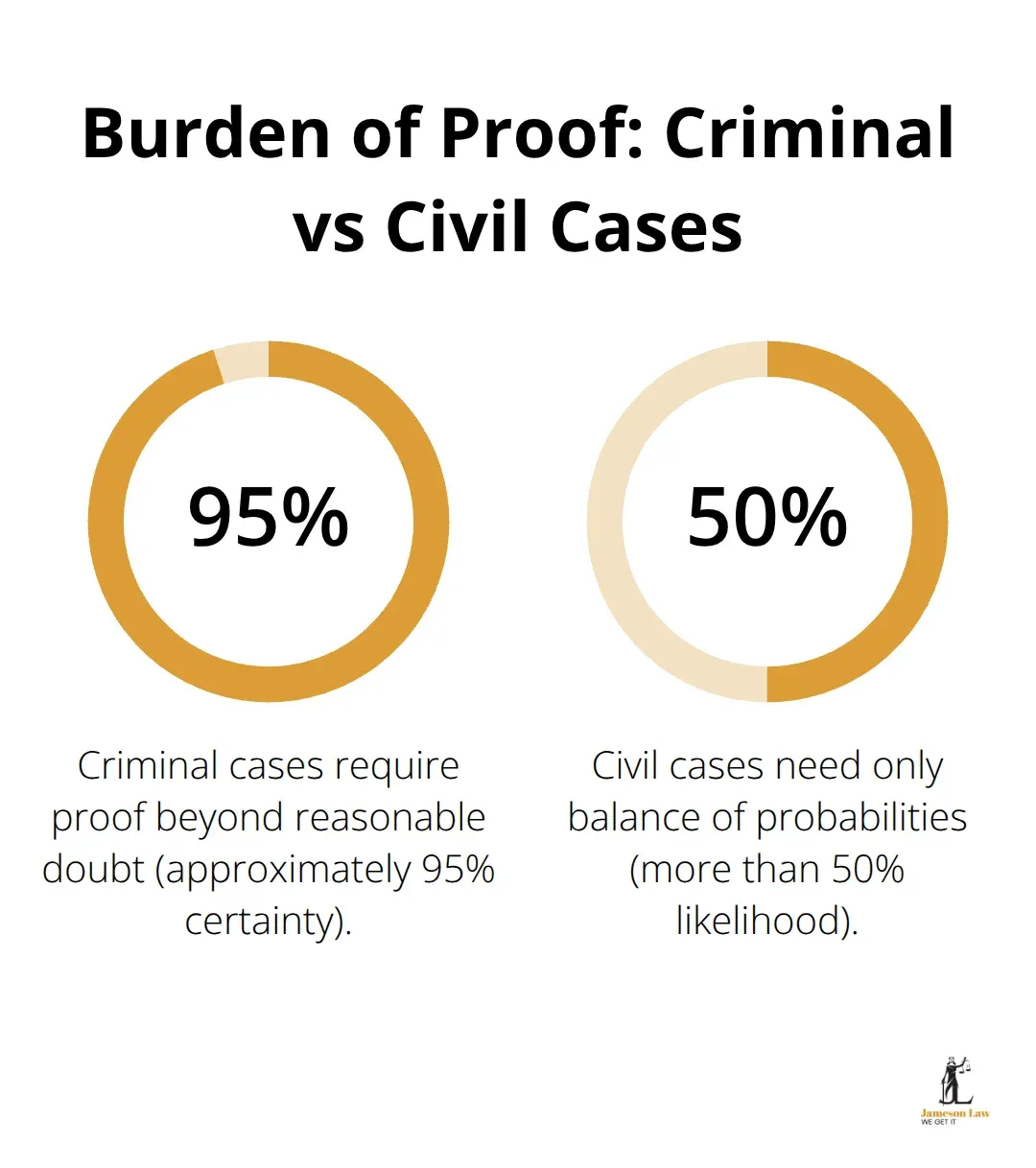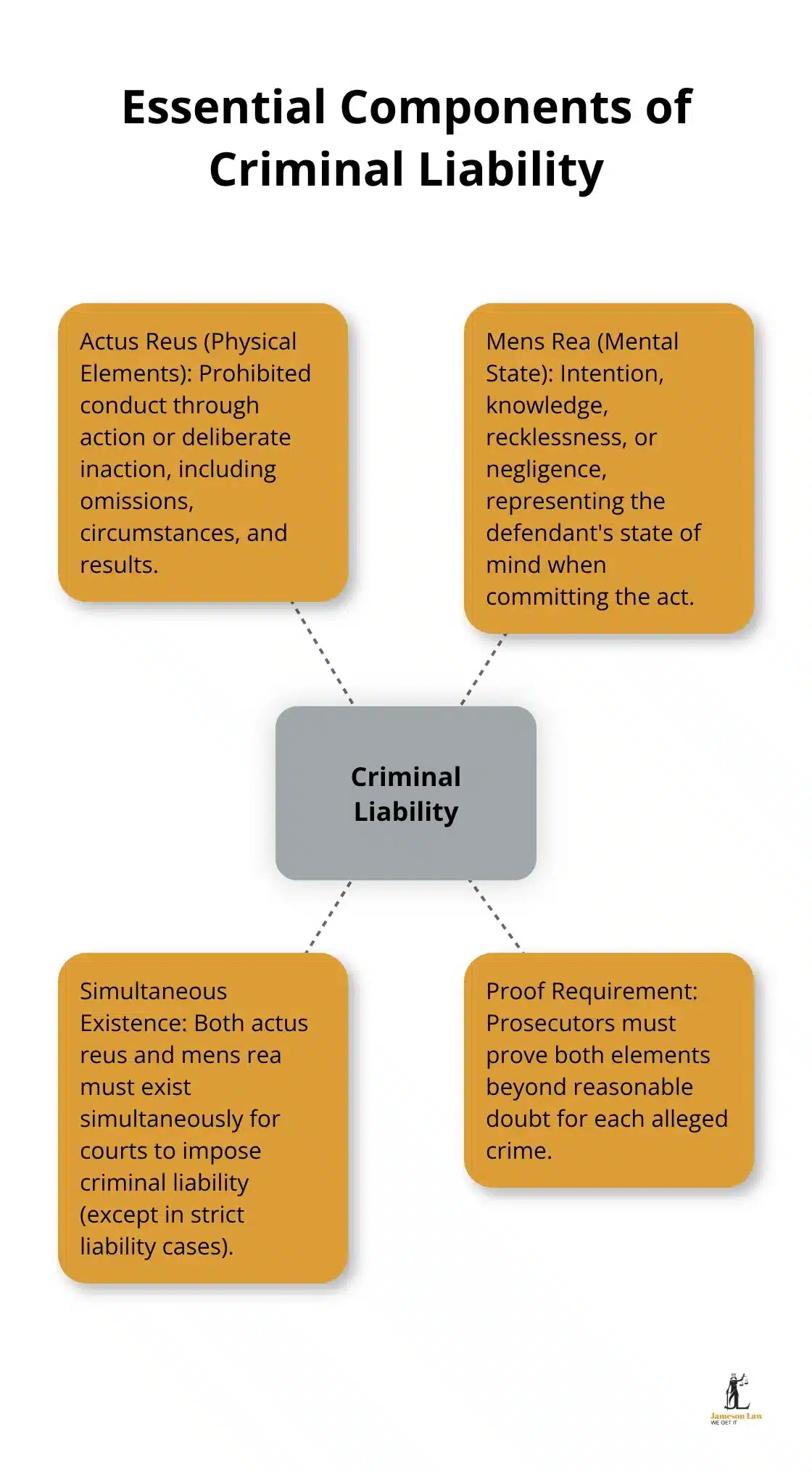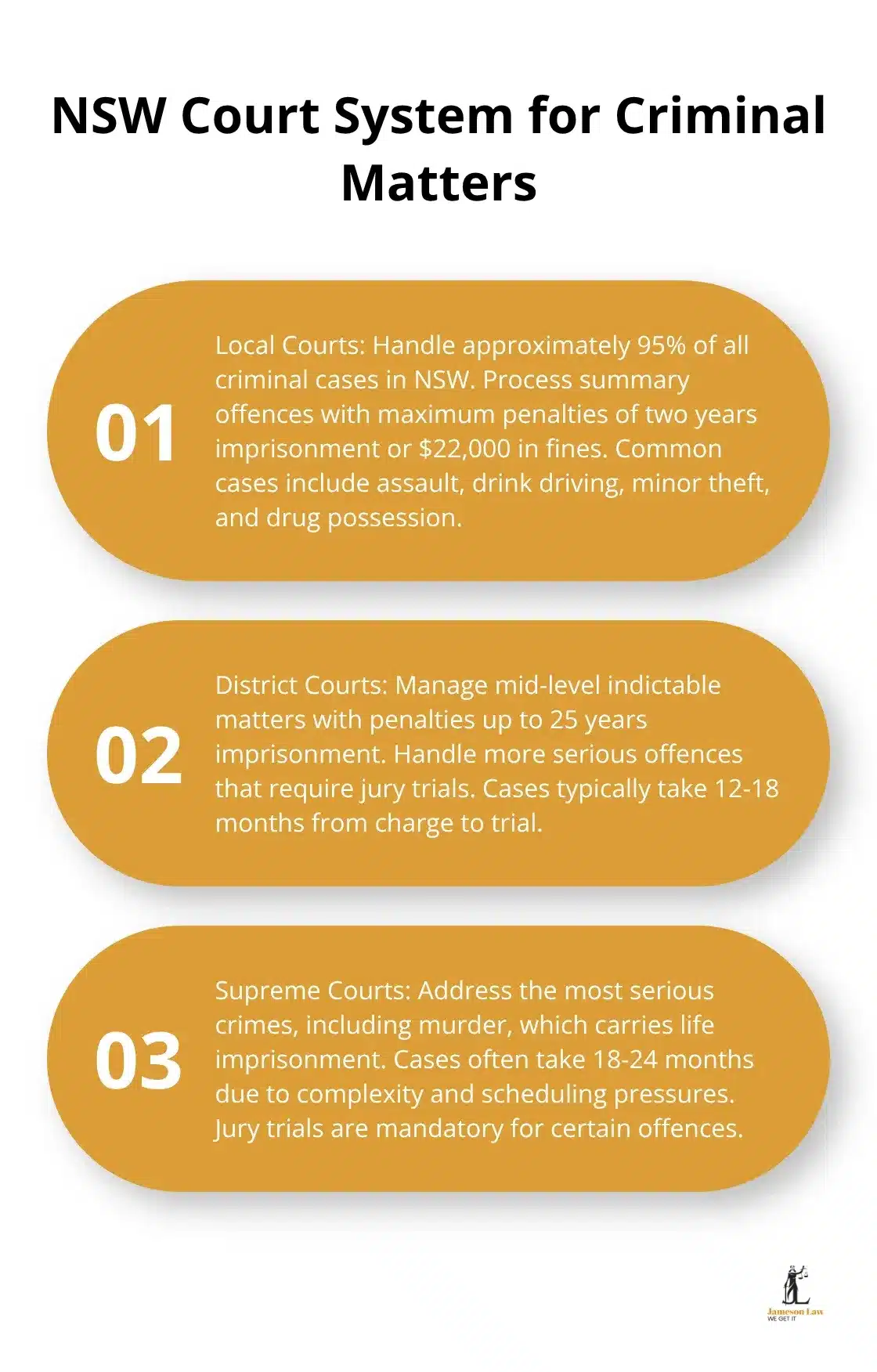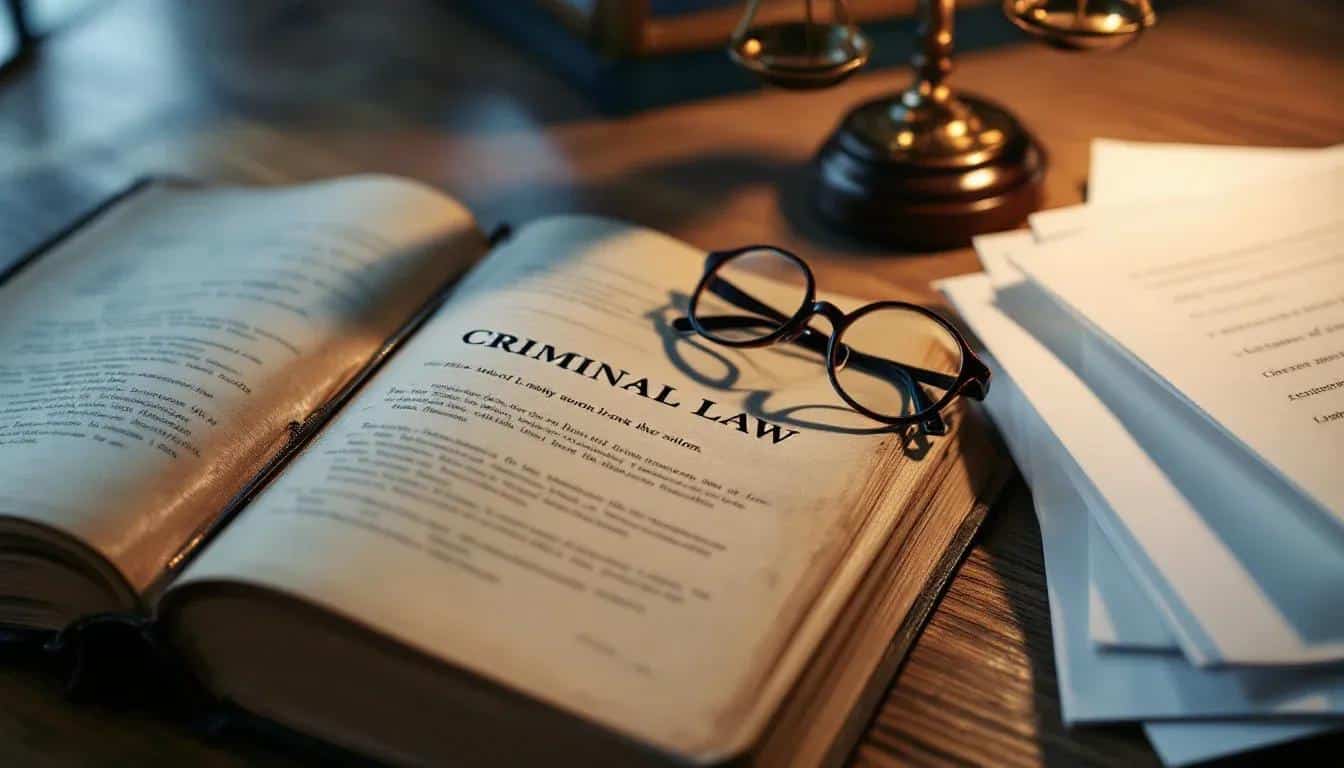Criminal law forms the backbone of Australia’s justice system, protecting society by defining what actions constitute crimes and their consequences. The principles of criminal law establish clear boundaries between acceptable and unacceptable behaviour.
We at Jameson Law see clients struggle with these complex legal concepts daily. This guide breaks down the fundamental elements that prosecutors must prove and the different types of offences you might encounter in NSW courts.
How Does Criminal Law Actually Work
Criminal law operates as the government’s primary tool for public order and safety maintenance across Australia. The Commonwealth Criminal Code Act 1995 establishes that most offences will require proof of a fault element – intention, knowledge, recklessness or negligence – with respect to one or more of their physical elements, which prosecutors must prove beyond reasonable doubt. This system differs fundamentally from civil law disputes between private parties.
The State’s Role in Criminal Prosecution
In criminal matters, the state prosecutes individuals who allegedly breach laws that protect society’s collective interests. The Crown Prosecution Service handles all criminal cases in NSW, where it represents the public interest rather than individual victims. This means victims cannot simply drop charges once police lay them – the state maintains control over prosecution decisions.
Crown Prosecution Authority Structure
The Director of Public Prosecutions decides whether to proceed with serious indictable matters, following general principles for criminal prosecutions, including the decision to prosecute, the prosecutor’s role, and selecting charges. Police prosecutors typically handle summary matters in Local Courts, while Crown prosecutors manage District and Supreme Court cases. This separation prevents private interests from interference with justice outcomes and maintains prosecutorial independence.
Key Differences Between Criminal and Civil Law
Criminal law focuses on punishment and deterrence through imprisonment, fines, or community orders. Civil law seeks compensation or specific performance between parties. The burden of proof differs significantly – criminal matters require proof beyond reasonable doubt (approximately 95% certainty), while civil cases need only balance of probabilities (more than 50% likelihood).

Criminal defendants face potential loss of liberty, which makes procedural protections more stringent. Double jeopardy provisions protect a person from being punished more than once for the same offending or being placed more than once in jeopardy, unless exceptional circumstances exist, such as tainted acquittals that involve perjury or intimidation.
These foundational structures set the stage for understanding how prosecutors must establish the specific elements that constitute criminal offences.
What Must Prosecutors Actually Prove
Prosecutors face a demanding task in criminal cases – they must establish both the physical act and the mental state behind every alleged crime. Section 5.6 of the Commonwealth Criminal Code requires proof of intention for conduct and recklessness for circumstances or results when no fault element is specified in an offence, which creates a two-pronged test that defendants can challenge at every stage.
The Two Essential Components Courts Require
The actus reus represents the prohibited conduct itself, whether through action or deliberate inaction. The mens rea captures the defendant’s state of mind when they committed the act. Both elements must exist simultaneously for courts to impose criminal liability (except in strict liability cases where mental state becomes irrelevant).

Physical Elements That Courts Examine
The physical component extends far beyond simple actions to include omissions, circumstances, and results. NSW courts recognise that failure to act can constitute criminal conduct when a legal duty exists – parents who neglect children or drivers who flee accident scenes face prosecution for what they didn’t do.
The Commonwealth Criminal Code defines physical elements to include intangible factors like consent in sexual assault cases or authority in fraud matters. Courts scrutinise timing, location, and method of alleged conduct. Prosecutors must prove each detail beyond reasonable doubt rather than rely on assumptions or probabilities.
Mental State Requirements and Proof Standards
Fault elements operate on a hierarchy from intention at the highest level through knowledge and recklessness down to negligence. Intention requires proof that defendants meant to bring about specific consequences, while knowledge focuses on awareness of circumstances or likely results.
Recklessness combines conscious risk-taking with substantial deviation from reasonable standards, which makes it easier for prosecutors to prove than intention. The High Court established in He Kaw Teh v R that the defence of honest and reasonable mistake of fact was available, preventing unjust punishment.
When Mental State Requirements Don’t Apply
Strict liability offences eliminate mental state requirements for regulatory matters like traffic violations or workplace safety breaches. These offences focus solely on whether the prohibited act occurred, regardless of the defendant’s intentions or awareness. This approach reflects the different categories of criminal offences that NSW courts handle daily.
Which Criminal Offences Face Which Courts in NSW
NSW’s court system processes criminal matters through a three-tier structure that determines both penalties and procedures based on offence severity. Local Courts handle approximately 95% of all criminal cases in NSW, processing summary offences with maximum penalties of two years imprisonment or $22,000 in fines. District Courts manage mid-level indictable matters with penalties up to 25 years, while Supreme Courts address the most serious crimes including murder (which carries life imprisonment). The Criminal Procedure Act 1986 NSW establishes that defendants charged with indictable offences generally have the right to elect jury trial, though some serious matters like murder must proceed to higher courts regardless of defendant preference.

Summary Matters and Local Court Limits
Summary offences include common assault, drink driving, minor theft, and drug possession charges that Local Court magistrates handle without juries. These matters typically resolve within 6-12 months from first court appearance, with magistrates imposing penalties ranging from conditional release orders to imprisonment terms up to two years. Traffic offences represent the largest category, with speeding fines starting at $130 and licence suspension periods varying from three months to five years depending on the severity.
Drug possession penalties vary significantly – cannabis possession under 15 grams attracts cautions for first offenders, while possession of other prohibited substances can result in $2,200 fines plus criminal conviction records.
Indictable Proceedings and Jury Requirements
Serious indictable matters require committal hearings in Local Courts before proceeding to District or Supreme Courts for trial. This two-stage process allows magistrates to determine whether sufficient evidence exists to warrant jury trial, with approximately 80% of committal proceedings resulting in defendants being committed for trial.
Jury trials involve 12 citizens who must reach unanimous verdicts for conviction in NSW, unlike some other Australian states that accept majority verdicts. The average time from charge to District Court trial extends 12-18 months, while Supreme Court matters often take 18-24 months due to case complexity and court scheduling pressures.
Strict Liability Offences and Special Categories
Strict liability offences eliminate the need to prove mental state elements, focusing solely on whether the prohibited act occurred. These offences typically involve regulatory matters such as workplace safety breaches, environmental violations, and certain traffic offences. Courts apply strict liability when public safety concerns outweigh individual culpability considerations, particularly in areas where compliance depends on maintaining high standards regardless of intent.
Final Thoughts
The principles of criminal law establish a complex framework that protects both society and individual rights through carefully balanced procedures. Courts require prosecutors to prove both physical acts and mental intent beyond reasonable doubt, except in strict liability matters where intent becomes irrelevant. Your rights remain protected through presumption of innocence, proper court procedures, and specific evidentiary requirements that prosecutors must meet.
The three-tier court system processes different offence categories with distinct penalties, from Local Court summary matters to Supreme Court indictable proceedings that require jury trials. Criminal charges carry serious consequences that include imprisonment, substantial fines, and permanent conviction records (which affect employment and travel opportunities). Early legal intervention often determines case outcomes, particularly during police interviews and initial court appearances where strategic decisions shape your defence options.
Professional legal assistance becomes essential when you face any criminal charge, regardless of perceived severity, because prosecutors possess significant resources and expertise that require equally skilled defence representation. We at Jameson Law provide expert criminal law representation across NSW. Contact us immediately if you face criminal charges to protect your rights and explore all available defence options.













